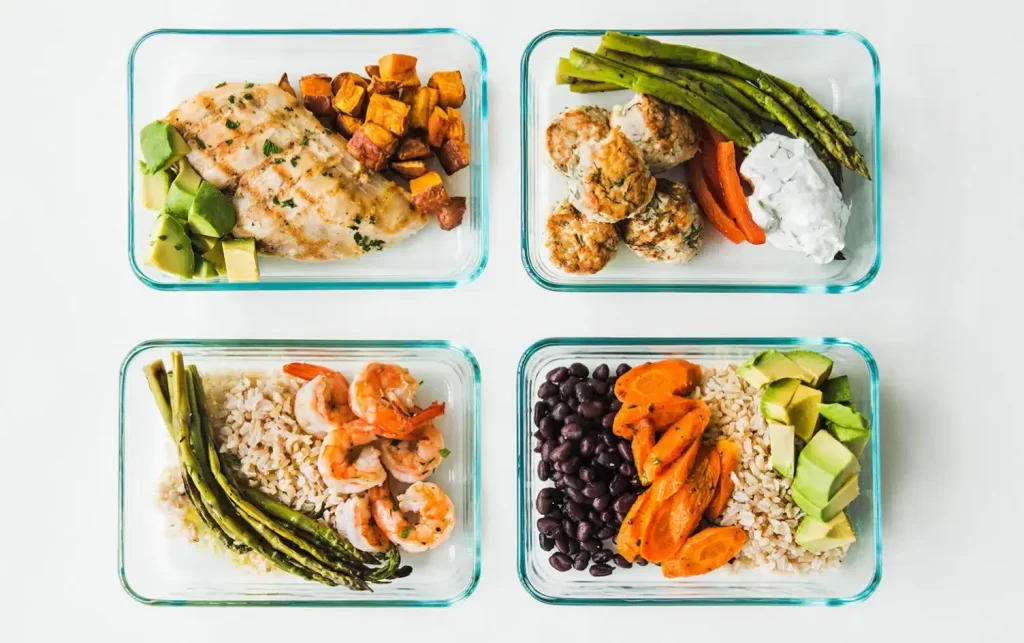Sunday social media can provide such a beautiful sight: An entire counter taken up by hard-boiled eggs, roasted chicken breast, colorful veggies and perfectly fluffy brown rice — all ready to go in perfectly portioned containers for meals throughout the week. It’s weekend meal-prep goals.
Spending a couple of hours to ensure you have nourishing meals for the week is one great strategy to reach your nutrition and weight-loss goals. “In order to adopt healthier eating habits that promote weight loss, you have to make it as easy as possible on yourself. If it feels too challenging or too time-consuming, your new eating habits will probably not be sustainable,” says Samantha Cassetty, RD.
Meal prepping makes it easy to eat healthfully no matter what curveball is thrown into your day (a busy schedule, extra stress, a last-minute deadline). “You’re more likely to reach for more calorie-dense foods in these situations, so meal prep gives you a no-brainer alternative, which helps support your goals,” Cassetty says. This strategy requires absolutely no willpower — you have a plan.
That’s all great, but many people find meal prep to be laborious and don’t necessarily enjoy cooking, notes Cassetty. “Loosening up your meal prep can save time and effort, so it fits more organically into your schedule,” says Cassetty. What’s more, even if you like a more rigid approach now, there might be a time in the future when you want to try another strategy to see if it fits your lifestyle better, she says.
The good news is you can still lose weight with a less complicated meal prep approach. Try these five tips to reap the benefits:
1. KNOW WHAT YOU WANT (GENERALLY)
Before your appointed grocery shopping day, look at your week and roughly outline what you’ll make, leaving room for impromptu meals and leftovers, says Cassetty. Maybe you only plan 1–2 breakfasts, 2–3 lunches and three dinners, she advises. For example, breakfast might be overnight oats. Lunch might be veggie chili or high-protein chicken salad over a bed of greens. Dinner might be a whole-grain pasta, salmon with veggies and turkey burgers. Allow yourself to mix-and-match and swap in whatever protein or veggies look good at the store. Bonus: This is a more budget-friendly approach, too. You can count on leftovers, quick fresh meals with pantry staples and a couple fun nights of takeout to round out the week.
2. OPT FOR SHORTCUTS
You don’t have to make it all yourself. “Determine what part of meal prep is especially daunting to you,” says Cassetty. Maybe going through the wash-chop-cleaning process of veggie prepping is particularly time-consuming. That’s where pre-washed broccoli florets in bags, salad kits, and bagged chopped kale or shredded Brussels sprouts come in handy. The work is done for you, and all you need to do is cook. Ready-to-heat-and-eat grains, like rice or quinoa, which come either in shelf-stable packaging or in the frozen section, mean you don’t even need a pot.
Or perhaps there’s an ingredient you’re really trying to eat more of, like lentils, but you find them intimidating and time-consuming to cook. These come in ready-to-eat bags (in the produce section). The same is true of other foods like beets. Also, go for store-bought rotisserie chicken, prepackaged hard-boiled eggs or pre-cooked chicken sausage for proteins that you only need to heat up.
3. COOK ONCE, EAT TWICE
Roast a few veggies to mix-and-match with your meals, says Cassetty. You can choose which ones you eat that day depending on what you’re in the mood for, making it more customizable to your tastes, which can (and often do) change regularly. The same can be said of different whole grains and proteins, which can easily be thrown together in grain bowls for combinations to suit your mood.
4. PREP ONCE, EAT TWICE
It’s not fun to chop up a dozen veggies and fruits for the week. But it’s also not so fun to take out your cutting board every day. So, combine the two tasks and, when you have your cutting board out, chop up one extra item. For example, says Cassetty, if you’re chopping broccoli, then cut red pepper strips for a snack tomorrow. If you’re making farro, double the batch, so you can eat leftovers another night.
5. PREP WHEN YOU HAVE THE ENERGY
While weekends are normally when people have more free time for meal prep, if that doesn’t work for you, don’t worry. Prepping when you have the time and energy makes it more enjoyable and sustainable instead of constantly dreading Sundays. Remember, whether it’s portioning snacks one morning or simply stocking up on healthy frozen meals, it all counts.
6. GET CREATIVE
It’s easy to prep the same thing over and over, but that can get boring fast and lead you to overeat or ditch meal prep altogether. Having leeway to make impromptu decisions (even when you’re at the grocery store) to try a new-to-you veggie or plan a Thai curry night instead of your usual pasta is key. This keeps things interesting and prevents boredom. A flexible path helps you make it a lifestyle, says Cassetty, which is the best way to support long-term health and weight-loss goals.







